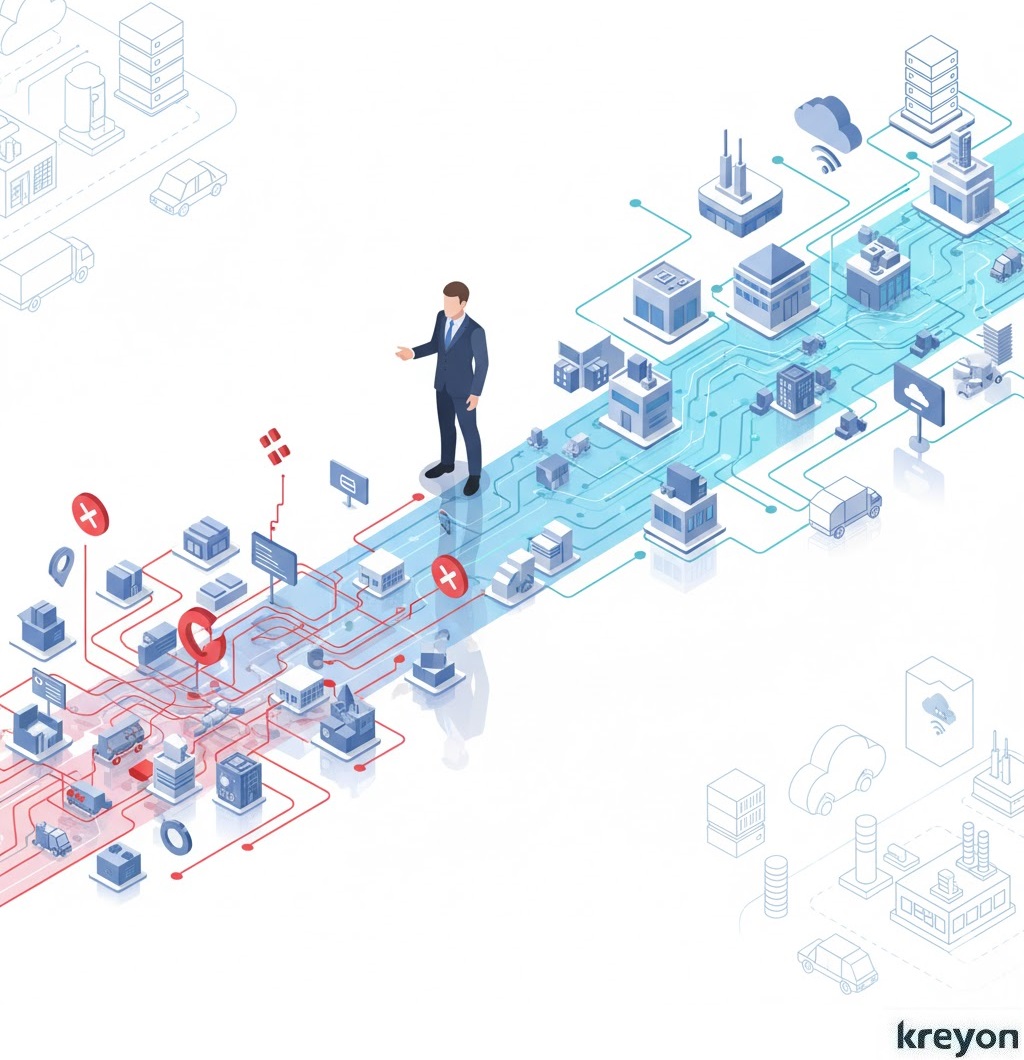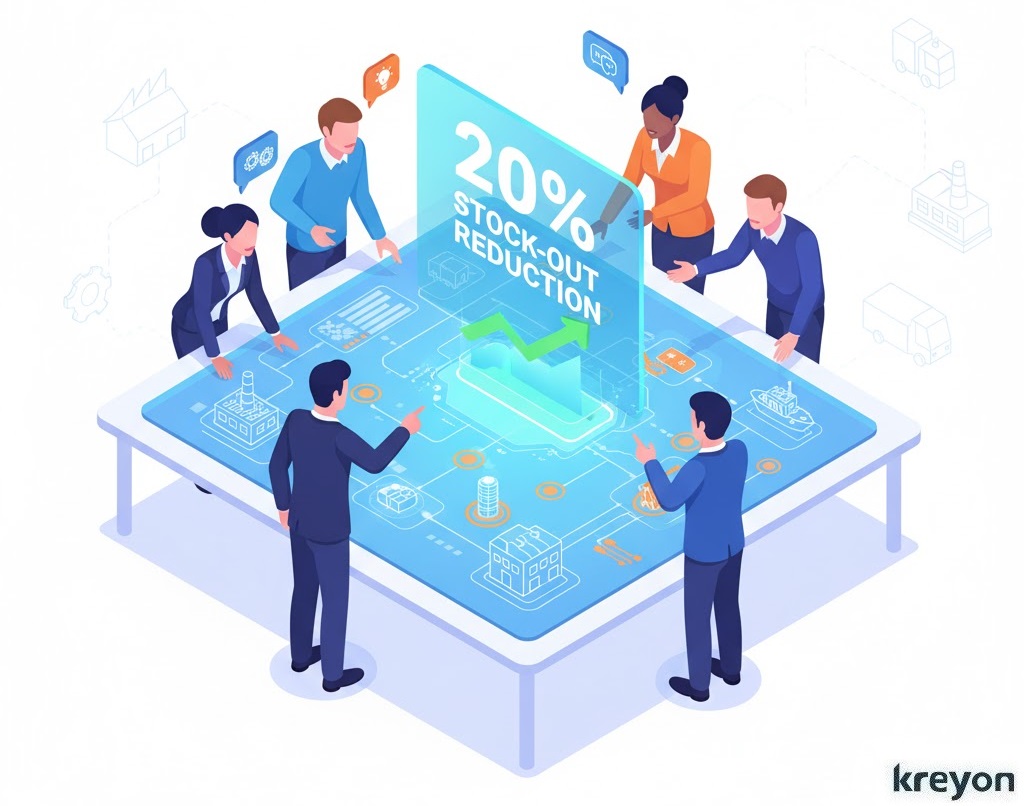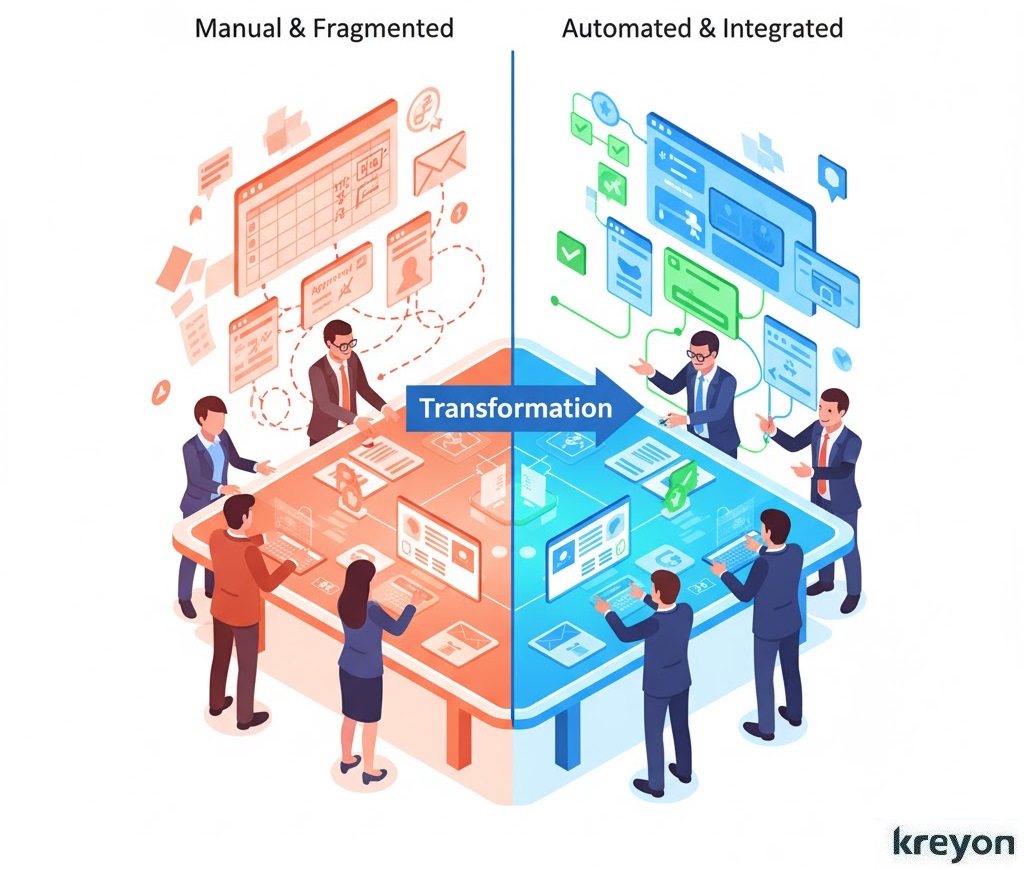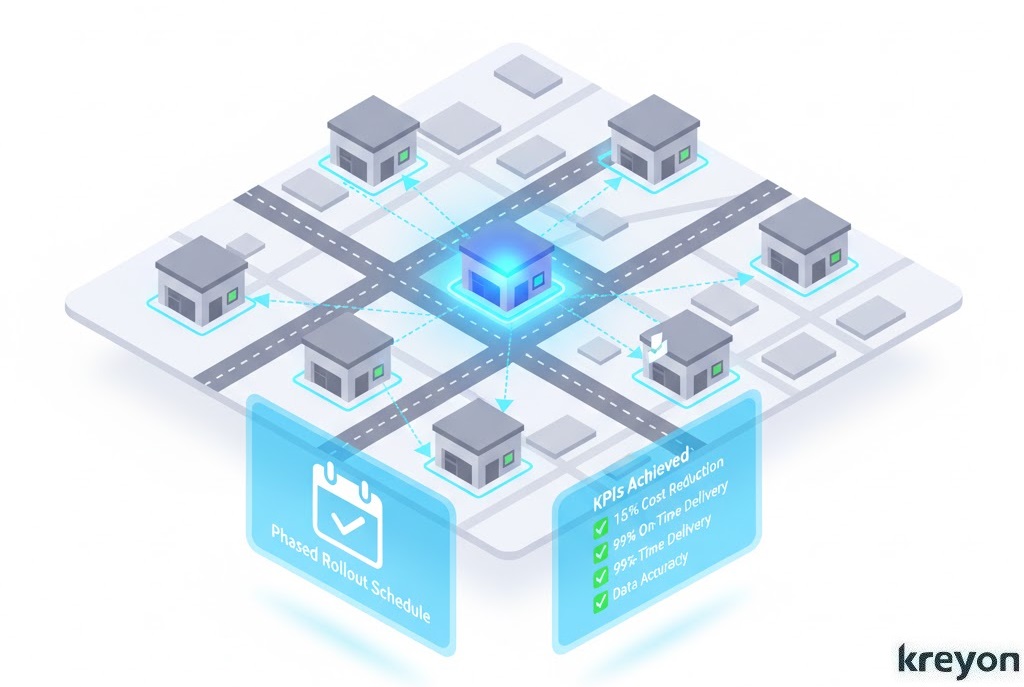
Implementing supply chain software is often pitched as a silver bullet for streamlining operations, boosting efficiency, and cutting costs. The glossy brochures and polished vendor demos promise transformative results: real-time visibility, seamless integrations, and data-driven decision-making.
But the reality? Over 80% of companies view their supply chain as a critical competitive advantage, yet the reality is tougher than it looks, recent research from Gartner reveals that 76% of logistics and supply‑chain transformations fail to meet key performance targets like budget, timelines, or KPIs.
It’s a complex, multifaceted journey that can be as challenging as it is rewarding. If you’re considering implementing supply chain software for your organization. There are critical insights, often left unsaid that you need to know to navigate the process successfully.
This article dives into the unfiltered truth about implementing supply chain software, offering practical advice, real-world lessons, and actionable strategies to ensure your implementation delivers on its potential.
Why Implementing Supply Chain Software Matters
Supply chain software has become a cornerstone of modern business operations. From inventory management to demand forecasting, these tools promise to optimize every link in the supply chain.
According to a 2024 report by Gartner, companies that invest in advanced supply chain technologies can reduce operational costs by up to 15% while improving delivery times by 20%. But the keyword here is *implementing*, the process of getting the software up and running is where the real work begins.
Too often, organizations dive into implementation with high expectations but little preparation for the roadblocks ahead.
Vendor promises can obscure the gritty realities: misaligned expectations, data integration headaches, and employee resistance. Let’s peel back the curtain and explore what no one tells you about implementing supply chain software.
1. It’s Not Just About the Software, It’s About Your People & Needs
The success of implementing supply chain software hinges on your team as much as the technology itself. No matter how cutting-edge the software, it’s your employees who will use it daily.
Resistance to change is one of the biggest hurdles. A 2023 study by McKinsey found that 70% of digital transformation projects fail due to lack of employee buy-in.
How to Overcome Resistance
– **Communicate the Why**: Before rolling out the software, clearly articulate why the change is necessary. Highlight tangible benefits, like how the software will reduce manual tasks or improve decision-making.
For example, a warehouse manager might appreciate how real-time inventory tracking cuts down on stockouts.
– **Involve Key Stakeholders Early**: Engage department heads, IT teams, and end-users during the planning phase. Their input ensures the software aligns with real-world needs and builds a sense of ownership.
– **Invest in Training**: Comprehensive training programs are non-negotiable. Offer hands-on sessions, user manuals, and ongoing support to ease the transition.
Consider appointing “super users†who can champion the software and assist colleagues.
By prioritizing people over processes, you lay a foundation for smoother adoption and long-term success.
2. Data Quality Is Make-or-Break

Supply chain software thrives on data, inventory levels, supplier performance, demand forecasts, and more. But here’s the catch: garbage in, garbage out.
Poor-quality data can derail even the most sophisticated system. During implementation, many organizations discover their data is incomplete, inconsistent, or siloed across departments.
Steps to Ensure Data Readiness
– **Conduct a Data Audit**: Before implementation, assess your existing data for accuracy and completeness. Identify gaps, duplicates, or outdated records.
– **Standardize Data Formats**: Ensure consistency in how data is entered and stored. For example, standardize naming conventions for products and suppliers across all departments.
– **Cleanse and Migrate with Care**: Data migration is a critical step in implementing supply chain software. Work closely with your vendor or IT team to map data fields accurately and test the migration process to avoid costly errors.
A leading client we worked with in the retail sector learned this the hard way. Their legacy systems had inconsistent product codes, leading to weeks of delays during implementation.
A thorough data cleanse before migration could have saved time and frustration. Set aside up to 40% of your project time (and budget) for data cleanup.You’ll be thankful later.
3. Customization Can Be a Double-Edged Sword
Many organizations are tempted to customize their supply chain software to fit existing processes. While tailoring the system to your needs sounds appealing, over-customization can lead to bloated budgets, extended timelines, and future upgrade challenges.
Striking the Right Balance
– **Leverage Out-of-the-Box Features**: Most modern supply chain software solutions, like SAP, Oracle NetSuite, or Blue Yonder, are designed with industry best practices in mind.
Before customizing, explore whether the software’s default features can meet your needs.
– **Prioritize Must-Haves**: If customization is necessary, focus on critical functionalities that align with your business goals.
For instance, a manufacturer might need custom reporting for production schedules but can adapt to standard inventory tracking.
– **Plan for Scalability**: Ensure customizations won’t hinder future upgrades or integrations. Consult with your vendor to understand the long-term implications.
Company spend millions on building heavily customized systems, only to struggle with compatibility issues during software updates. A leaner approach saves them significant rework.
Get your teams involved from day one. Show them how it improves their work. Celebrate the quick wins. And yes, train them, more than once.
4. Integration Is Harder Than It Sounds
Supply chain software doesn’t operate in a vacuum. It needs to integrate with existing systems like ERP, CRM, or warehouse management tools.
Vendors often downplay integration challenges, but in reality, connecting disparate systems can be a logistical nightmare.
Tips for Seamless Integration
– **Map Your Ecosystem**: Create a detailed map of your current tech stack, including APIs, data flows, and dependencies. This helps identify potential integration pain points early.
– **Test Early and Often**: Run integration tests during the pilot phase to catch issues before full deployment. For example, test how the software syncs with your ERP to ensure real-time data accuracy.
– **Work with Experts**: If your internal IT team lacks integration expertise, consider hiring a consultant or relying on your vendor’s professional services.
One thing we always recommend at Kreyon Systems? Start with a “visibility cockpit.†This is a central dashboard where you can track the flow of materials, spot bottlenecks, and react in real time.
5. Change Management Is Non-Negotiable

Implementing supply chain software isn’t just a technical project, it’s a business transformation. Without a robust change management strategy, even the best-laid plans can falter.
Change management involves preparing, equipping, and supporting your organization through the transition.
Building a Change Management Plan
– **Assign a Change Leader**: Appoint a dedicated project manager to oversee the implementation and act as a liaison between stakeholders, IT, and the vendor.
– **Set Clear Milestones**: Break the implementation into phases (e.g., planning, testing, training, go-live) with measurable goals. Communicate progress regularly to keep everyone aligned.
– **Celebrate Wins**: Acknowledge small victories, like successful pilot tests or completed training sessions, to maintain momentum and morale.
A 2024 Deloitte survey found that organizations with strong change management practices are 3.5 times more likely to achieve successful software implementations. Don’t underestimate its importance.
6. Post-Implementation Is Just the Beginning
Many organizations assume the hard work ends once the software goes live. In reality, post-implementation is where the real optimization begins. Performance monitoring, user feedback, and continuous improvement are critical to maximizing ROI.
Post-Implementation Best Practices
– **Monitor KPIs**: Track key performance indicators like order fulfillment rates, inventory turnover, or forecast accuracy to measure the software’s impact.
– **Gather Feedback**: Regularly solicit input from users to identify pain points or opportunities for improvement.
– **Plan for Updates**: Supply chain software evolves with new features and patches. Stay in touch with your vendor to ensure your system remains current.
Let’s be real, going live is just the beginning. The market shifts. Customer expectations change. Your network evolves. The best supply chains are never done, they’re always optimizing.
7. Vendor Relationships Are Key
Your software vendor isn’t just a supplier, they’re a partner in your success. Choosing the right vendor and maintaining a strong relationship can make or break your implementation.
Building a Strong Vendor Partnership
– **Vet Vendors Thoroughly**: Look beyond features and pricing. Evaluate the vendor’s track record, support offerings, and industry expertise.
– **Set Clear Expectations**: Document requirements, timelines, and deliverables in the contract to avoid misunderstandings.
– **Maintain Open Communication**: Schedule regular check-ins with your vendor during and after implementation to address issues promptly.
At Kreyon, we help clients build living dashboards, real-time scoreboards that leadership actually cares about.
8. Metrics Shape Outcomes

A slick interface is nice. But let’s talk about what moves the needle. You need KPIs that tie directly to business outcomes.
The Metrics That Actually Matter
– **Forecast accuracy**: Measures how closely actual demand matches predicted demand, reducing overstock and shortages.
– **Inventory turnover**: Shows how efficiently inventory is sold and replaced within a given period.
– **Stockout rates**:Â Indicates how often items are unavailable when customers or production need them.
– **Perfect Order Rate**:Â Tracks the percentage of orders delivered on time, complete, undamaged, and with accurate documentation.
– **OTIF (On-Time In-Full)**:Â Measures the reliability of deliveries by tracking how many orders arrive on schedule and in full quantity.
– **Cash-to-Cash cycle time**:Calculates how long cash is tied up in inventory before it’s converted back into revenue
Metrics are the steering wheel of supply chain management software, they translate daily operations into measurable business outcomes.
Shift your mindset: You’re not installing software. You’re building a smarter, faster, more resilient organization.
Conclusion: Plan Smart, Implement Smarter
Implementing supply chain software is a high-stakes endeavor that can transform your operations, if done right.
By addressing the overlooked challenges of employee adoption, data quality, integration, & hidden costs, you can avoid common pitfalls and set your organization up for success.
The key is to approach implementation with eyes wide open, armed with a clear strategy and a commitment to change management.
Implementing supply chain software isn’t just about technology, it’s about aligning people, processes, and data to drive meaningful outcomes.
Kreyon Systems implements next-generation supply chain software that connects people, processes, and data in real time to meet business goals. If you have queries, please contact us.
The post What No One Tells You About Implementing Supply Chain Software appeared first on Kreyon Systems | Blog | Software Company | Software Development | Software Design.